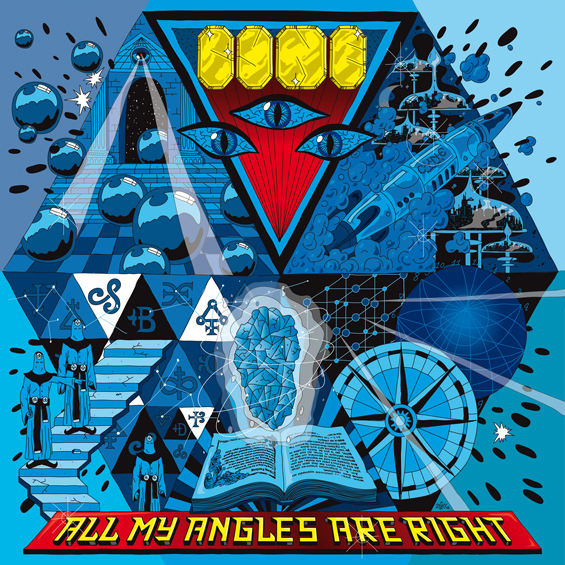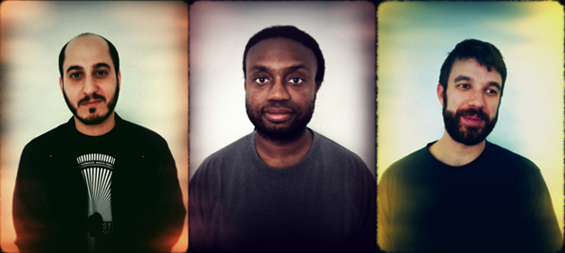Articles
CYNE
Helge Sten
Albums
Juhani Aaltonen
Absent Without Leave
Esteban Adame
The Alvaret Ensemble
Gordon Ashworth
Atiq & EnK
A/T/O/S
Brooklyn Rider
Causa Sui
Laura Cetilia
CYNE
DJ Q
Henrik Otto Donner
Edit Select
Farben & James DIN A4
The Green Kingdom
Alexander Hawkins
Chester Hawkins
Hydras Dream
Marsen Jules
Dominic Lash Quartet
David T. Little
Lufth
Lunatik Sound System
Macdonald & Crispell
Emilia Mårtensson
Stephan Meidell
Minibus Pimps
NickBee
Orcas
Quentin Sirjacq
Tesla286
Thumbscrew
Tokyo Isolation Chamber
Christina Vantzou
Compilations / Mixes
7 Years Of Outcross
15 Shades of White
Anomalie 003 Series
The Boogie Volume 4
Ladies & Gentlemen
EPs / Cassettes / Mini-Albums / Singles
2DeepSoul
Blackstone Rngrs
Baptiste & Pierre Colleu
L'estasi Dell'oro
William Ryan Fritch
Mutated Forms
SCAR
Theodore + Wurst

photo: Ben Sellon
ALL THE RIGHT ANGLES
TEN QUESTIONS WITH CYNE
CYNE (Cultivating Your New Experience) has been dazling listeners with its soulful hip-hop sound since the group's inaugural release, the twelve-inch African Elephants (Rice and Beans), appeared all the way back in 2001. In the years since, numerous EPs, singles, and full-lengths have appeared on labels such as Botanica Del Jibaro, City Centre Offices, Project Mooncircle, and Hometapes, the latter the group's primary label outlet since the release of 2008's Pretty Dark Things. For the longest time a quartet comprising MCs Akin (Akin Yai) and Cise Star (Clyde Graham) and producers Speck (Michael Gersten) and Enoch (David Newell), CYNE is now a three-man unit with Akin no longer involved. But long-time fans needn't worry: the group's latest album, All My Angles Are Right (reviewed here), proves that in its current iteration CYNE is as strong and vital a creative force as ever. We recently had the great pleasure of speaking with the group about the new album as well as related matters.
"Tears for Uriah" (All My Angles Are Right, Hometapes)
1. I know I speak for many when I say how wonderful it is to have a new CYNE album once again in the world. Does All My Angles Are Right have a particular theme (or themes), lyrically and otherwise?
ENOCH: First of all, thank you…we are very excited about finally being able to get this record out into the world. Speaking from a production aspect, Speck and I typically put together the music in such a way that everything is tied together, whether it is through the overall vibe, tone, instrumentation, whatever it may be. I think that, in its own way, can sort of create a thematically cohesive project… I'll let Cise answer about lyrical themes…
CISE: I would say the theme for this new album is us, CYNE. Sonically as the only lyricist on the album, it's a personal journey of finding my singular voice and conveying it in the most creative way I could but still keeping things listenable and personal. The overarching themes of philosophy, religion, science, and pop culture interplay throughout the whole album.
SPECK: We initially set out to make this album with a few objectives in mind (for example, we kept throwing the words “upbeat” and “uptempo” around), but completely abandoned those types of objectives about a year or so into the writing/recording process. Once we did, the themes and tonality took on a particular shape and personality of their own—somewhere between warm/dusty car music, paranoid tech-noir narratives, and spiritually charged introspections.
2. What in your view differentiates the new album from those that came before it?
ENOCH: To me, this album is a culmination of the three of us really honing in on what we all bring to the table individually and making those pieces fit in the best way. Each of us has distinct and disparate influences and styles, and over time we've really refined it so that CYNE is a synthesis of all of those things. All My Angles Are Right is really an extension of what we've always done; we've just gotten better at the presentation of it.
SPECK: To sort of echo Enoch, our internal dialog about All My Angles Are Right became increasingly more fluid. It was somewhat surreal and natural, all at once, because we were living inside the world of this record for so long in a way that we never had before. Our communication skills and self-editing were stronger, and maybe that just comes from experience and age. There were minor, effective evolutions to our production and mix approaches. And we definitely mined in newer sample and gear territories that we hadn't previously explored.
3. There's something about the CYNE sound that's so distinctive, it allows your music to be identified as yours instantly. How would you characterize the CYNE sound, and what is there about it that makes it so clearly different from that of other hip-hop-based outfits?
ENOCH: That's an interesting question. We really have not intentionally tried to create a distinctive sound for ourselves, but we have heard that there is a distinct “CYNE sound” before. I think that we strive to make music that we find challenging and interesting, and our standard for making songs begins and ends with whether or not we like those songs as listeners. We all listen to a wide variety of music, and although everything we do is rooted in hip-hop, I think we let those influences inform our music in maybe a more direct way than some other groups might.
SPECK: I would add that (to reiterate the whole self-editing thing) we've worked together long enough to know what inspires us, challenges us, and complements each member's skills and interests. So it's reassuring to be told that there's a consistent CYNE thread, and that we're still “us,” after all of these years. Because, to Enoch's point, our tastes and inspirations reflect in our “sound.” We aim to synthesize and incorporate those elements into our music, as we grow, in the ways that we know how—and, we do that for ourselves.
4. Even though you've been making music for more than a decade (Discogs lists your first release, the twelve-inch African Elephants, as having appeared in 2001), your music has gotten stronger over the years, with the albums from 2008 on—Pretty Dark Things, Starship Utopia, Water For Mars, Wasteland Vol. 1, and now All My Angles Are Right—constituting an especially amazing collection of music. And unlike a great many hip-hop outfits whose time in the spotlight has been relatively brief, CYNE sounds more vital on the new album than ever. How do you account for your longevity? And how have you managed to keep your music sounding so fresh despite having released music for so many years now?
CISE: Still in love with what we do and not afraid to be different. But, at the same time, we're level-headed people who have to go to work every day. Going to work every day has made that much easier, by the fact that at the end of the day there is new music to be made. Speaking for myself, it keeps me hungry and yearning to take things up a step creatively
ENOCH: I think the ultimate reasons for our longevity is our love for making music. I would make beats for myself if I didn't have any other outlet for it, and I do that on the side as well, as does Speck. We genuinely love creating this music and pushing ourselves to make better songs. I think if we ever get to a point where we are just going through the motions for the sake of something other than making music that we genuinely are excited about, then that would be the day that we would cease to exist as CYNE. We are fortunate to truly have an effortless chemistry between us where nothing is really ever forced, and truthfully, it is rare that any one of us has objections to an element of a song. In the entire existence of CYNE, there has only been a handful of tracks that have been scrapped or heavily revised, and I think that is a testament to not only the standard that we hold ourselves to, but also to our working relationship and natural chemistry. We are good friends other than just being in a group together, and that goes a long way towards making our music work.
SPECK: To reiterate what both Cise and Enoch shared, time spent on music is so much more focused and productive than ever before (after home life, after work life, etc.), and the desire to make music (emotionally, technically, leisurely, etc.) is always there. It's a necessary outlet, with any number of challenges, constraints, or surprises that we find rewarding.

5. Album tracks like “Avians,” “Tears For Uriah,” and “Fine Prints” (with its beautiful “Better late than never” vocal sample) exude a particularly soulful and radiant vibe. While those are qualities that are generally present in CYNE's music, did you consciously go out of your way to bring those qualities out in the new album's material?
ENOCH: It is pretty rare that we go out of our way to explicitly bring out certain qualities in our songs. I think we naturally tend to gravitate towards certain things sonically, and the sweet spot where that all overlaps more often than not probably ends up in that place that can probably best be described as soulful and radiant. Soulful can be a misnomer too… just because you might sample a soul song, doesn't necessarily make it a soulful song. The soulful part lies in the emotion and the heart that you put into it. We strive to make our music meaningful and personal on one level or another.
6. And then, it seems, there were three. Is Akin Yai no longer a member of the group? And beyond the obvious change in CYNE's vocal presentation, has his absence altered the group's sound and if so in what way?
ENOCH: Akin is no longer in CYNE, but we want it to be clear that there is no drama, no beef, no problem. We are all still cool, and have all continued to work with him on music in different capacities. He is pursuing a solo career and doing his own thing, and we definitely wish him the best and will help him out in any way we can. As far as his absence altering our sound, I think the answer is yes and no. It definitely gives Cise Star more of a load to bear as far as lyrical content, but I think it also gives him free reign to purely focus on writing a song from his own perspective.
CISE: Akin is currently pursuing solo endeavors which we support and appear on. As for CYNE of course it affects the sound in the sense it is now one voice carrying the weight of the group, but at the same time we made a conscious effort to keep the signature CYNE sound.
7. Has your production approach changed over the years, given the dramatic advances in technology and software we've witnessed? To what degree is your approach to track construction still rooted in crate-digging and sampling?
ENOCH: In some ways our production techniques have changed, but I think the majority of that change has come from learning and experience more than technology. I personally predominantly still use the tried-and-true techniques of sampling, but there has slowly been a little more use of instruments or other sample sources. There are times where I think that I want to step outside the box and try using different equipment or different techniques, but I always end up coming back to the MPC and samples. To me, that's what everything is rooted in and what I know best, and there is only so far that I can stray from that.
SPECK: I'd say that ninety-five percent of the time, our tracks start with samples. Some gear has worked itself into the process, such as analog synths (for additional melody or bass lines) and outboard effects/pedals (reverbs, compression, and delays). I used the OP-1 for a few tracks on the album (“Null” was almost entirely made with the OP-1), but I used it the same way I use the MPC (chopping, pitching, effecting, and sequencing samples). But we're still mostly using the MPC and ProTools (poorly) after a decade of making music. The best part is: sampling has become more fun for me, after all these years. I've always appreciated the process and challenges of it, the search for records, and the tactile approach to chopping and programming… it's all gotten better with time.
8. I'm curious about the development process that a CYNE track undergoes. Could you use one of the new album tracks to illustrate the steps a typical CYNE production goes through from beginning to end?
SPECK: “Spaces” is probably a good example to use, because it was the last song that we recorded. The process (which is pretty straightforward) starts with Cise writing to the beat (the “Spaces” beat was one of Enoch's that we felt could tonally round out the album). Then, he and Enoch got together in Gainesville to record and then sent me the files to work with (I'm in Portland). In the case of “Spaces,” I added some percussion, atmospheric synths, and a few more expressive samples for effect. A rough vocal mix, with these new elements, was passed back and forth for notes. Then, we dove into an aggressive final mix “session” (we don't like to drag out the mixing process if we don't have to, especially when we were at the tail-end of the album production), which is where a lot of the best details come to fruition (vocal effects, where to drop sounds in/out, intros and outros, etc).
9. It's pretty rare for an MC's lyrics to cover subject matter like Plato's Myth of the Cave (from The Republic) and Uriah the Hittite (the soldier in King David's army who's mentioned in the Second Book of Samuel). Do you specifically seek out and draw inspiration from particular sources for your lyric writing or is it more whatever's in your thoughts as you're exposed to different material in your everyday life?
CISE: A little bit of both. But, mainly, I think that since I'm a pretty avid reader, I get exposed to different ideas that constantly lead me to searching out topics in science, religion, and philosophy… three topics that I personally find fascinating. It may be something I saw or read that sparks an idea, and I'll expound upon that while in the writing process.
10. There's no shortage of societal ills to comment on in the world today. As a lyricist and MC, what do you see as the most pressing issues that need to be addressed?
CISE: I would say environment and the economy. Well, I guess not the economy in the sense we need to just balance the budget, but we need to rethink as a society our attitude toward money and how to best use it to maximize the greater good. When the focus is to solely maximize profit and then follow it up with the misuse of hoarded money it leads to consequences that unfortunately affect the most vulnerable, which is the working class and the poor. Of course, there's nothing wrong with being wealthy. I hope to be wealthy myself within my lifetime, but there's a fine line between profits and greed and what lengths one goes to to obtain that wealth.
The environment is a no-brainer; if you shit where you sleep there is bound to be a shitty situation. I am by no means an activist and can definitely do better myself. At the end of the day we are only destroying ourselves if we do not get a better handle on the bigger picture.

April 2014
![]()